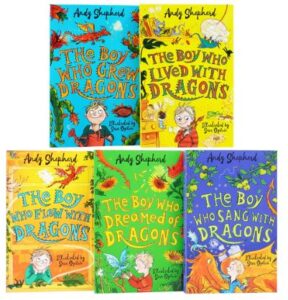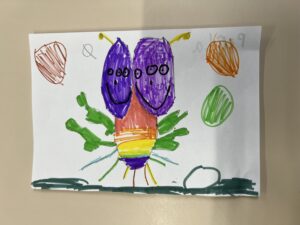Would you have a dragon as a pet? (English – new class novel)
We always have a ‘class novel’ that we read at story time and use to enhance our writing and reading lessons. They have mostly been picture books so far. This term, we are reading a short chapter book – The Boy Who Grew Dragons by Andy Shepherd.
All the classes are reading this book and we are loving it so far! Who wouldn’t want a dragon as a pet?
Help at home by asking what has happened in the book so far. You could borrow a copy from your local library (or buy one if you’d like) to read alongside at home (don’t tell us the ending too soon though). You could also find other books to read by the same author.
KS1 – Topic
This half term KS1 are studying Computing in Topic. Last week, we discussed what a computer is and what sort of devices we might have at home that have a computer built-in.
This week, we have been looking at algorithms. We have been learning all about the program ‘Scratch Jr’ and how to create an algorithm. We know how to set a sequence so that our Sprites (characters) move, shrink, grow and turn.
We also learnt how to debug an algorithm that does not work and how to alter a sequence.
We’ve had a lot of fun using Scratch and learning about all of the buttons and how they work. We are really looking forward to using the program again next week and learning more!


World Book Day
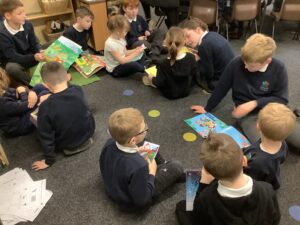



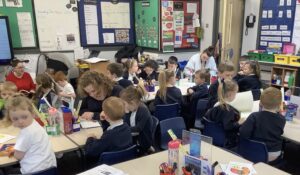
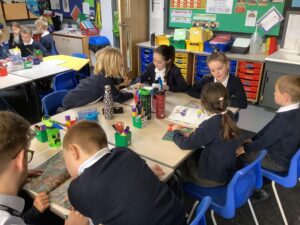
One of the ways we have celebrated World Book Day is by shared reading. The year 5/6 children visited KS1 this morning to read our favourite books to us. The children enjoyed being read to and sharing why they liked their books.
The adults have also been sharing their favouirte books with the children.
Reading with automaticity and fluency : Poem of the week
We really enjoyed our Poem of the week last week. After reading it every day, we become fluent and read with more and more automaticity. This makes the children feel like ‘real readers’. It also inspired us to draw our own aliens.
Help at home by encouraging your child to read the poem of the week to you when they bring home a copy of it on Fridays.
World Book Day 2023 (but we’re doing all week!)
We enjoyed a brilliant video chat with Julia Donaldson and Axel Scheffler today. They read stories to us and Axel showed us how he does his illustrations. You can enjoy their new book, The Baddies, here. (This is a YouTube link. Top tip for watching YouTube with your child: go to the settings cog along the play bar and turn off autoplay – this avoids an inappropriate clip coming up automatically, and helps to discourage your child from passively watching clip after clip.)
Maths – dividing by 2
Our current Maths focus in Year 2 is multiplication and division. This week in 2C, we have been practising dividing by 2 by using sharing and grouping methods.
‘We know that dividing by two also means halving.’
Today, we worked in small groups to divide even numbers equally into two groups.
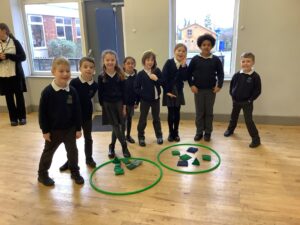
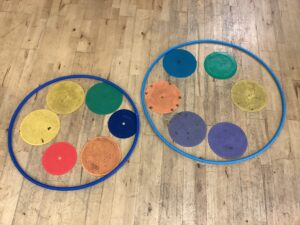

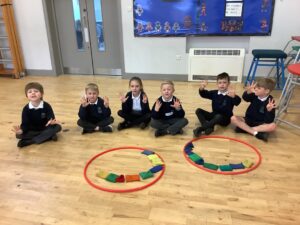
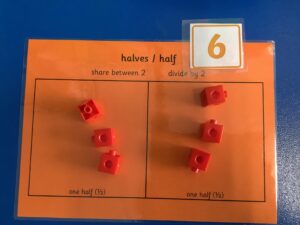


Help at home by collecting objects in the house such as fruit, coins or beads and dividing them equally into 2 groups. Make sure that you collect an equal number of objects! Challenge your child by asking them to explain why you have chosen an even number to divide into 2!
Geography topic and thanks to Scholes in Bloom
We really enjoyed our Geography topic last half term. We discovered an issue with pollution (litter) in our school grounds after doing a survey. So, we decided to sort it out! We made posters to remind ourselves to recycle and bin our rubbish and also did a litter pick with pickers borrowed from Scholes in Bloom.
Poem of the week performed by 1,2B – Ice Lolly
We’re loving reading and learning a poem (or song) each week. This week, we read Ice Lolly by Pie Corbett. You can watch it here. It helps with our remembering, fluency and prosody skills.
Maths – division
This week in 2C we have been practicing dividing by 2, 5 and 10. We have had lots of practice sharing cubes and other classroom objects into equal groups. We have also been practicing different equations on our whiteboards by grouping.


Help at home by practicing dividing objects into equal groups!
Living and Learning : Safer Internet Day
We worked really hard on Safer Internet Day to learn about how to stay safe online. We wrote about what we can do to stay safe online and read a story, Chicken Clicking, to help us understand this too.
Help at home by making sure your children know your rules about going on the internet at home.
